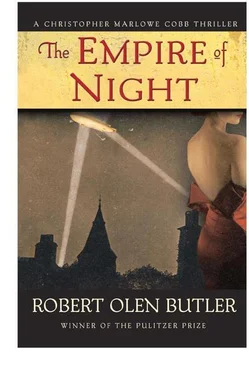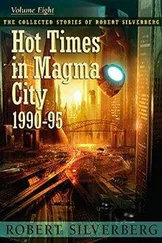May he punish it.
I’d heard this already several times in the street. It seemed universal in this town. No doubt in the country. Part quotidian mutual greeting, part liturgical call and response.
The emcee seamlessly rolled on into his introduction. He was sorry, he said, but the next scheduled singer had died last night from a broken heart. The crowd let out a moan, but it was instant and exaggerated and as the emcee went on in faux eulogy, the curtain at the back of the stage, which to the eye seemed flush against the wall, opened in the center and a woman in cadaverous whiteface and a tight black dress emerged.
The crowd made a collective sound once more, part horrified gasp, part incipient laugh.
Jeremy leaned toward me. “You mentioned an opportunity?”
The crowd was laughing outright now.
I leaned toward Jeremy. It was well past sunset outside. “I did.”
We emerged from the Gray Dog without any further word until Jeremy pointed south on Borsig-Strasse with his chin and we walked off in that direction.
“I have a motor car,” he said.
“Glad to hear it,” I said.
A few steps later I said, “You don’t strike me as a cabaret type of guy.”
“I didn’t choose,” he said. “You were right about our having friends in the place. The orderly minds at the Foreign Office see the threat there from Bohemians, not foreign agents.”
“Hide in plain sight.”
“There was a time,” Jeremy said, “when the woman in black would have sung her death-by-boredom from the idiot speeches of a parody Kaiser. A Quassel-Wilhelm .”
The constructed German word meant a “gibberish-Wilhelm.”
“Now,” he said, “the censors only have to worry about keeping the girls’ private parts hidden.”
The political satire period of the Kabarett ended more than a decade ago.
“Were you a cabaret type of guy back then?”
“Back then I was already a British pub type of guy.”
“We are alone now,” I said. “I asked you inside about the pro-Brits.”
Instantly, flatly, he said, “There are no pro-Brits in Germany.”
We went another couple of steps, with me waiting for him to elaborate.
He stopped.
But he simply said, “This is it.” He nodded to a Model T tourer, its canvas top latched in place, sitting at the curb. Henry Ford, quietly conquering the world.
Jeremy made no move to get in. He lifted his face a little, looking away from me briefly, finding words. “Not in the way ‘pro-Brit’ sounds,” he said. “Those who would help us here are not disloyal. They are not working for the British. They are working against the gibbering Kaiser and the world-conquering Pickelhauben. ”
He identified the German military leaders by their ridiculous, polished-leather, brass and silver-trimmed, spiked helmet — the Pickelhaube —that sat up over the ears, protecting very little except the feelings of inadequacy of the officers beneath them.
“Is that you as well?” I said. “Aren’t you pro-Brit?”
The question lifted him up by the chest just a little. It had taken him by surprise.
“I am a Brit,” he said.
“Born?”
“No,” he said. “But naturalized.”
“Do you have people in Germany?”
“I boxed as an Englishman. Every professional fight.”
“Then you are English,” I said.
“My mother lives in Spandau,” he said. “For her, the Kaiser can do no wrong.”
He was speaking softly now. Making no move to his Ford. “My brother, who has lived with our mother — she is a widow — my brother is now an artillery lieutenant. His mind is fiercely opposed to the gibbering Kaiser and the world-conquering Pickelhauben. But he thinks there is no other way to be a loyal German.”
We thought about this, both of us, for a few moments.
I said, “Didn’t you have to become an Englishman to truly fight the Kaiser and his generals?”
He did not hear me. We had each come to a thought. I had merely spoken mine first. Breaking his own separate silence, he now said, “In spite of our past, we are capable of a republic.”
I heard the we . I did not challenge him on it. I didn’t have to. I trusted this man. In spite of his blood.
“Where do we go from here?” he said.
I was not sure which we he meant.
“The East Harbor,” I said.
“In our American car, imported through London,” he said. “Pre-war. It’s had a few years of hard use, but it will be loyal to us.”
He circled to the driver’s side, reached in to the coil box, and switched the battery into its chattery readiness.
“I’ll crank,” I said, heading for the front of the Ford.
At the steering wheel levers, he retarded the spark and advanced the gas just a little. I bent below the radiator and clutched the crank with my left hand, carefully tucking my thumb alongside my fingers. I gave the crank of this worldwide symbol of American industry a sharp tug, and it rattled into life.
On the way to Reinauer’s, I briefed Jeremy on my afternoon. We crossed the Spree and approached the East Harbor on Schlesische-Strasse, passing under the Oberbaum Bridge.
“Slow now,” I said, and we rolled by the front of Number 11. I saw no lights.
I directed Jeremy around the block and we approached on Cuvry-Strasse, from the south.
We parked and shut down in front of the building at the edge of Reinauer’s delivery lot. We could see the left-hand loading dock from where we sat.
There were no lights at the back either.
I said, “I’m guessing he’s got a man inside.”
“Probably,” Jeremy said. “Tonight at least.”
“But if he’s in there, I’d rather confront him on our terms.”
“Agreed.”
“I’ll be right back,” I said. I opened the door. “A little reconnaissance.”
I closed the door and beat it softly across the macadam toward the loading dock. The air smelled of grain and diesel and creosote.
I pulled my tungsten flashlight and went softly up the side steps. I cupped the beam end with my other hand and shined it low, though I was very aware now of my Mauser and of any sound from inside, just in case. I shined the beam all around the dock surface, starting where I watched the two mugs smoking this afternoon. The stack of pallets was gone and so were any butts they might have dropped.
I moved along past the big steel-slat rolling entrance, and as I neared the access door at the end of the dock I started scanning the light in front of me.
I found what I was looking for. I crouched to a couple of cigarette butts. Flattened but unscuffed. Unswept.
I beat it back to the Ford.
“We need your good right hand,” I said.
So we set up to wait with Jeremy at one side of the door and me just down the steps at the other side, my Mauser drawn, in case things went wrong somehow. His fist was our first choice. Which he got a chance to use pretty quick. I was looking off the other way when the door clicked and its hinges chirped and then there was a little choked what-the-hell sound and the crack of bone and a major thud.
I went up and Jeremy was already coming around to drag the guard’s body back inside. I followed.
The place was deeply shadowed, but across the main floor the guy had turned on the electric light in the windowless shipping office.
Jeremy slipped off in that direction. I closed the outside door and took a little tour. The main floor was mostly empty, but beyond a row of packing tables, my flashlight found an arrangement of wooden boxes and crates and shipping drums. All large. Bigger than Stockman’s two boxes. I was convinced this wasn’t the part of the haystack we should be looking in anyway.
Читать дальше












